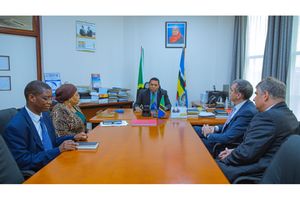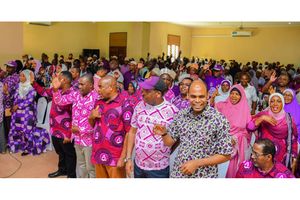EAC leaders unanimously agree on ways to mitigate climate change

What you need to know:
- Primarily, EAC will have to start with increased investment in climate-smart agriculture and clean energy technologies.
Arusha. The East African Community (EAC) leaders have outlined ways to mitigate climate change and boost food production.
Primarily, EAC will have to start with increased investment in climate-smart agriculture and clean energy technologies.
The regional leaders who met in Arusha yesterday were firmly in agreement with the approach to taming climate-related crises.
"This is the best approach to mitigate the impact of climate change and improve access to food," they said.
The regional leaders held their 23rd Ordinary Summit at the Ngurdoto Mountain Lodge outside Arusha city.
Yesterday's summit was preceded by the EAC High- Level Forum on Climate Change and Food Security on Thursday at the same venue.
They were in consensus that increasing forest cover across the region would minimise the impact of climate change, a phenomenon associated with global warming.
Additionally, they rooted for carbon trading, a mechanism initiated by the United Nations in the 1990s to contain greenhouse gas emissions.
Already, in Tanzania, discussions are underway between the government and 22 private companies on carbon trade projects.
According to the Minister for Natural Resources and Tourism, Angela Kairuki, the economy can earn about $20 billion from carbon trade.
The regional presidents, led by host President Samia Suluhu Hassan, also spoke on the need for climate financing for Africa.
They stressed the need for enhanced cross-border management of the natural resources, notably water and forests, in the region.
Among the technologies proposed to improve food security are rainwater harvesting and others that will reduce post-harvest losses of food.
The Heads of State also disclosed that the EAC would approach the upcoming COP 28 Climate Summit to be held in Dubai on November 30th as a bloc.
Outgoing EAC Chair President Evariste Ndayishimiye, the Chairperson of the Summit and President of Burundi, said that his country has taken measures to become more climate resilient.
Burundi, a tiny mountainous state in the Great Lakes region, has invested heavily in agroforestry to protect its land against soil erosion.
His government embarked on an afforestation programme five years ago to ensure that “our landscape is covered by forests."
President Hassan underscored the role of the private sector in driving home climate-smart agriculture in order to increase food production.
According to her, Tanzania was investing in climate-smart technologies through the Build Better Tomorrow (BBT), an initiative aimed at increasing the involvement of youth and women in agriculture.
She disclosed that the government was facilitating access to climate financing by encouraging commercial banks to lend to green projects.
Kenya’s President William Ruto said that his country has prioritised the conservation of its water towers, which are being fenced off to guard against encroachment and destruction.
He described Kenya as 80 percent arid and semi-arid, saying that the country doesn’t have enough rain but has adequate water.
His government had hired 1,000 new forest rangers to ensure that there was adequate human capital to protect the national forest cover by planting 15 billion trees over the next 10 years.
Kenya has purposed to build 100 mega dams for the purposes of increasing food production through irrigation, he pointed out.
Rwandan Prime Minister Edouard Ngirente said that the country had opted to create synergy between the government and the private sector to increase investment in agriculture.
Uganda’s first deputy prime minister and minister of EAC Affairs, Rebecca Kadaga, said her country would enhance the protection of wetlands by evicting people from these marshlands.
She called for optimal use of the Congo and Nile rivers’ basins to increase food production potential in the EAC region and Africa in general.
The EAC secretary general, Peter Mathuki, underscored the importance of the EAC having a common position as it goes to COP 28.
Dr Mathuki said that no country should have to choose between its development aspirations and climate change mitigation, adding that there was a need for complementarity as opposed to competition among EAC states.
The heads of state attending the summit were President Hassan, William Ruto of Kenya, Yoweri Museveni (Uganda), Evariste Ndyayishimiye (Burundi), and Salvar Kiir of South Sudan.
Presidents Paul Kagame of Rwanda and Felix Tshisekedi of the Democratic Republic of the Congo (DRC) were represented by their senior government officials.
Also present was President Hassan Sheikh Mohamud of Somalia, whose Horn of Africa country has applied to join the EAC.



